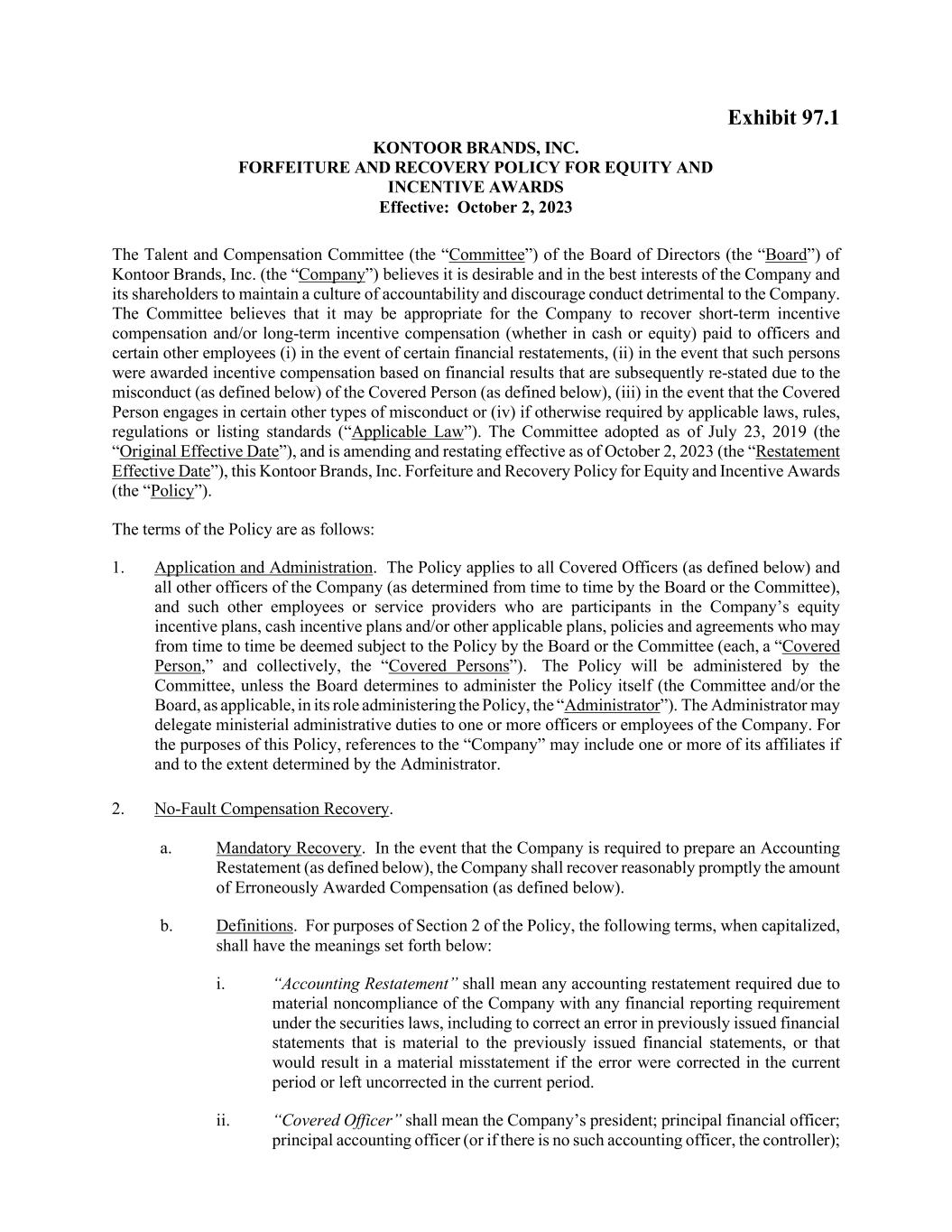
KONTOOR BRANDS, INC. FORFEITURE AND RECOVERY POLICY FOR EQUITY AND INCENTIVE AWARDS Effective: October 2, 2023 The Talent and Compensation Committee (the “Committee”) of the Board of Directors (the “Board”) of Kontoor Brands, Inc. (the “Company”) believes it is desirable and in the best interests of the Company and its shareholders to maintain a culture of accountability and discourage conduct detrimental to the Company. The Committee believes that it may be appropriate for the Company to recover short-term incentive compensation and/or long-term incentive compensation (whether in cash or equity) paid to officers and certain other employees (i) in the event of certain financial restatements, (ii) in the event that such persons were awarded incentive compensation based on financial results that are subsequently re-stated due to the misconduct (as defined below) of the Covered Person (as defined below), (iii) in the event that the Covered Person engages in certain other types of misconduct or (iv) if otherwise required by applicable laws, rules, regulations or listing standards (“Applicable Law”). The Committee adopted as of July 23, 2019 (the “Original Effective Date”), and is amending and restating effective as of October 2, 2023 (the “Restatement Effective Date”), this Kontoor Brands, Inc. Forfeiture and Recovery Policy for Equity and Incentive Awards (the “Policy”). The terms of the Policy are as follows: 1. Application and Administration. The Policy applies to all Covered Officers (as defined below) and all other officers of the Company (as determined from time to time by the Board or the Committee), and such other employees or service providers who are participants in the Company’s equity incentive plans, cash incentive plans and/or other applicable plans, policies and agreements who may from time to time be deemed subject to the Policy by the Board or the Committee (each, a “Covered Person,” and collectively, the “Covered Persons”). The Policy will be administered by the Committee, unless the Board determines to administer the Policy itself (the Committee and/or the Board, as applicable, in its role administering the Policy, the “Administrator”). The Administrator may delegate ministerial administrative duties to one or more officers or employees of the Company. For the purposes of this Policy, references to the “Company” may include one or more of its affiliates if and to the extent determined by the Administrator. 2. No-Fault Compensation Recovery. a. Mandatory Recovery. In the event that the Company is required to prepare an Accounting Restatement (as defined below), the Company shall recover reasonably promptly the amount of Erroneously Awarded Compensation (as defined below). b. Definitions. For purposes of Section 2 of the Policy, the following terms, when capitalized, shall have the meanings set forth below: i. “Accounting Restatement” shall mean any accounting restatement required due to material noncompliance of the Company with any financial reporting requirement under the securities laws, including to correct an error in previously issued financial statements that is material to the previously issued financial statements, or that would result in a material misstatement if the error were corrected in the current period or left uncorrected in the current period. ii. “Covered Officer” shall mean the Company’s president; principal financial officer; principal accounting officer (or if there is no such accounting officer, the controller);
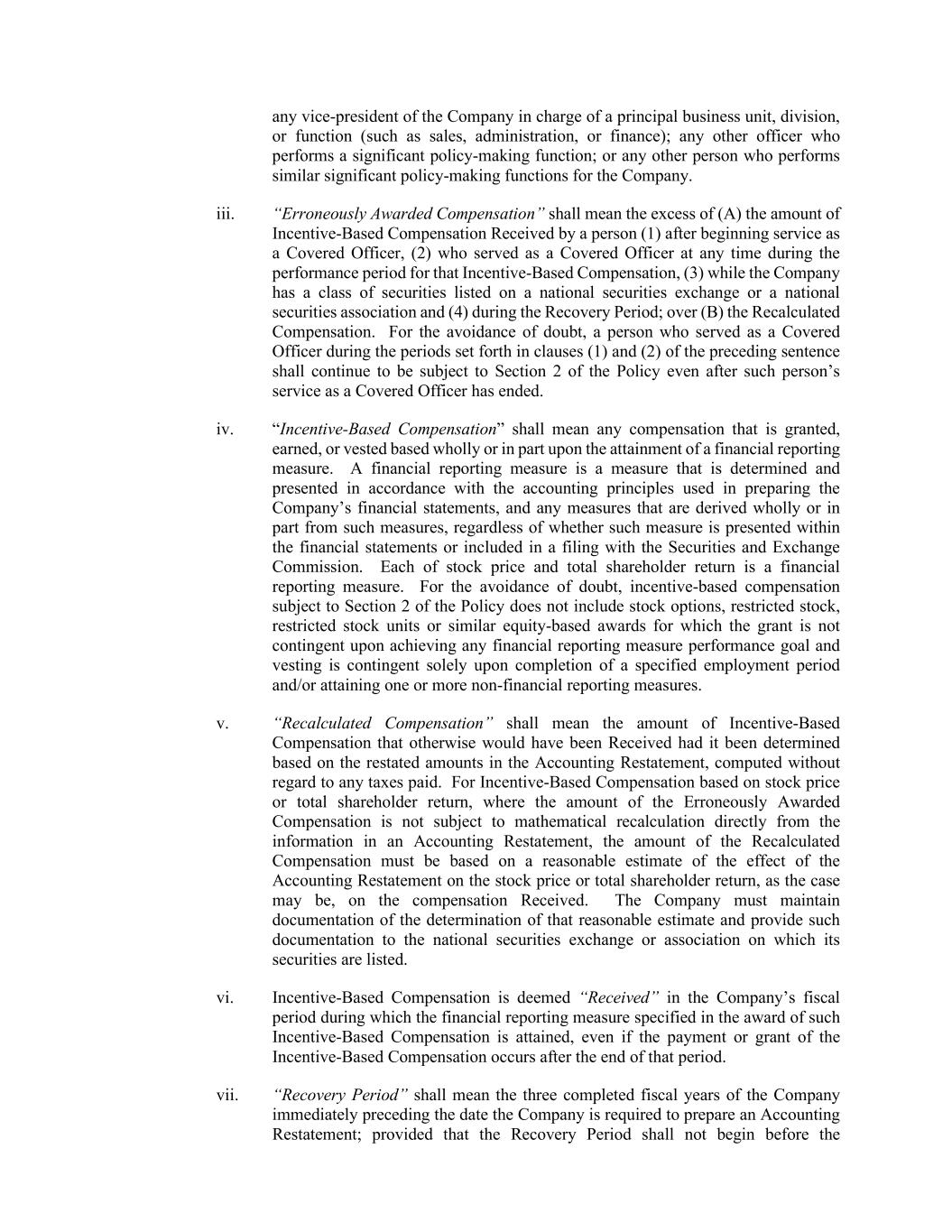
any vice-president of the Company in charge of a principal business unit, division, or function (such as sales, administration, or finance); any other officer who performs a significant policy-making function; or any other person who performs similar significant policy-making functions for the Company. iii. “Erroneously Awarded Compensation” shall mean the excess of (A) the amount of Incentive-Based Compensation Received by a person (1) after beginning service as a Covered Officer, (2) who served as a Covered Officer at any time during the performance period for that Incentive-Based Compensation, (3) while the Company has a class of securities listed on a national securities exchange or a national securities association and (4) during the Recovery Period; over (B) the Recalculated Compensation. For the avoidance of doubt, a person who served as a Covered Officer during the periods set forth in clauses (1) and (2) of the preceding sentence shall continue to be subject to Section 2 of the Policy even after such person’s service as a Covered Officer has ended. iv. “Incentive-Based Compensation” shall mean any compensation that is granted, earned, or vested based wholly or in part upon the attainment of a financial reporting measure. A financial reporting measure is a measure that is determined and presented in accordance with the accounting principles used in preparing the Company’s financial statements, and any measures that are derived wholly or in part from such measures, regardless of whether such measure is presented within the financial statements or included in a filing with the Securities and Exchange Commission. Each of stock price and total shareholder return is a financial reporting measure. For the avoidance of doubt, incentive-based compensation subject to Section 2 of the Policy does not include stock options, restricted stock, restricted stock units or similar equity-based awards for which the grant is not contingent upon achieving any financial reporting measure performance goal and vesting is contingent solely upon completion of a specified employment period and/or attaining one or more non-financial reporting measures. v. “Recalculated Compensation” shall mean the amount of Incentive-Based Compensation that otherwise would have been Received had it been determined based on the restated amounts in the Accounting Restatement, computed without regard to any taxes paid. For Incentive-Based Compensation based on stock price or total shareholder return, where the amount of the Erroneously Awarded Compensation is not subject to mathematical recalculation directly from the information in an Accounting Restatement, the amount of the Recalculated Compensation must be based on a reasonable estimate of the effect of the Accounting Restatement on the stock price or total shareholder return, as the case may be, on the compensation Received. The Company must maintain documentation of the determination of that reasonable estimate and provide such documentation to the national securities exchange or association on which its securities are listed. vi. Incentive-Based Compensation is deemed “Received” in the Company’s fiscal period during which the financial reporting measure specified in the award of such Incentive-Based Compensation is attained, even if the payment or grant of the Incentive-Based Compensation occurs after the end of that period. vii. “Recovery Period” shall mean the three completed fiscal years of the Company immediately preceding the date the Company is required to prepare an Accounting Restatement; provided that the Recovery Period shall not begin before the
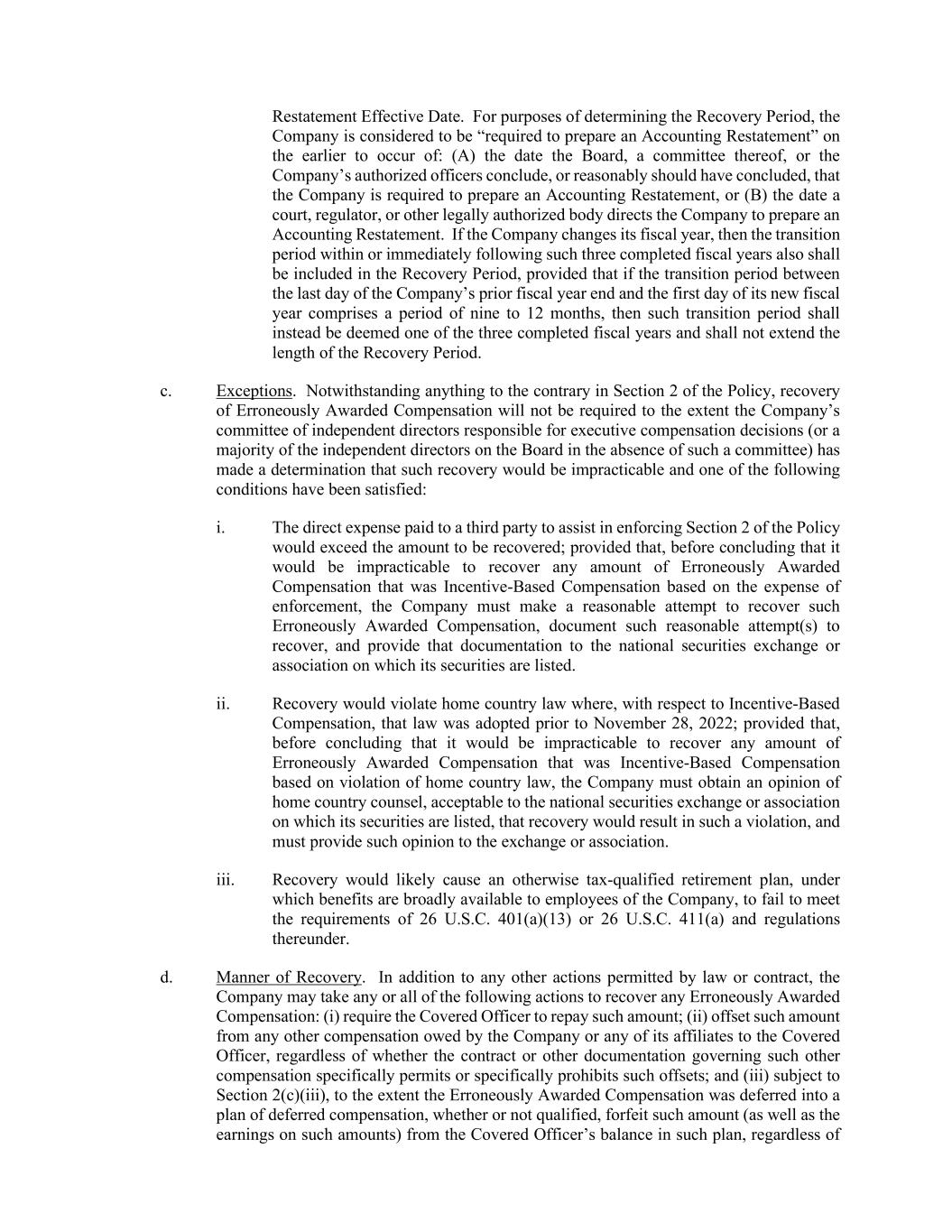
Restatement Effective Date. For purposes of determining the Recovery Period, the Company is considered to be “required to prepare an Accounting Restatement” on the earlier to occur of: (A) the date the Board, a committee thereof, or the Company’s authorized officers conclude, or reasonably should have concluded, that the Company is required to prepare an Accounting Restatement, or (B) the date a court, regulator, or other legally authorized body directs the Company to prepare an Accounting Restatement. If the Company changes its fiscal year, then the transition period within or immediately following such three completed fiscal years also shall be included in the Recovery Period, provided that if the transition period between the last day of the Company’s prior fiscal year end and the first day of its new fiscal year comprises a period of nine to 12 months, then such transition period shall instead be deemed one of the three completed fiscal years and shall not extend the length of the Recovery Period. c. Exceptions. Notwithstanding anything to the contrary in Section 2 of the Policy, recovery of Erroneously Awarded Compensation will not be required to the extent the Company’s committee of independent directors responsible for executive compensation decisions (or a majority of the independent directors on the Board in the absence of such a committee) has made a determination that such recovery would be impracticable and one of the following conditions have been satisfied: i. The direct expense paid to a third party to assist in enforcing Section 2 of the Policy would exceed the amount to be recovered; provided that, before concluding that it would be impracticable to recover any amount of Erroneously Awarded Compensation that was Incentive-Based Compensation based on the expense of enforcement, the Company must make a reasonable attempt to recover such Erroneously Awarded Compensation, document such reasonable attempt(s) to recover, and provide that documentation to the national securities exchange or association on which its securities are listed. ii. Recovery would violate home country law where, with respect to Incentive-Based Compensation, that law was adopted prior to November 28, 2022; provided that, before concluding that it would be impracticable to recover any amount of Erroneously Awarded Compensation that was Incentive-Based Compensation based on violation of home country law, the Company must obtain an opinion of home country counsel, acceptable to the national securities exchange or association on which its securities are listed, that recovery would result in such a violation, and must provide such opinion to the exchange or association. iii. Recovery would likely cause an otherwise tax-qualified retirement plan, under which benefits are broadly available to employees of the Company, to fail to meet the requirements of 26 U.S.C. 401(a)(13) or 26 U.S.C. 411(a) and regulations thereunder. d. Manner of Recovery. In addition to any other actions permitted by law or contract, the Company may take any or all of the following actions to recover any Erroneously Awarded Compensation: (i) require the Covered Officer to repay such amount; (ii) offset such amount from any other compensation owed by the Company or any of its affiliates to the Covered Officer, regardless of whether the contract or other documentation governing such other compensation specifically permits or specifically prohibits such offsets; and (iii) subject to Section 2(c)(iii), to the extent the Erroneously Awarded Compensation was deferred into a plan of deferred compensation, whether or not qualified, forfeit such amount (as well as the earnings on such amounts) from the Covered Officer’s balance in such plan, regardless of
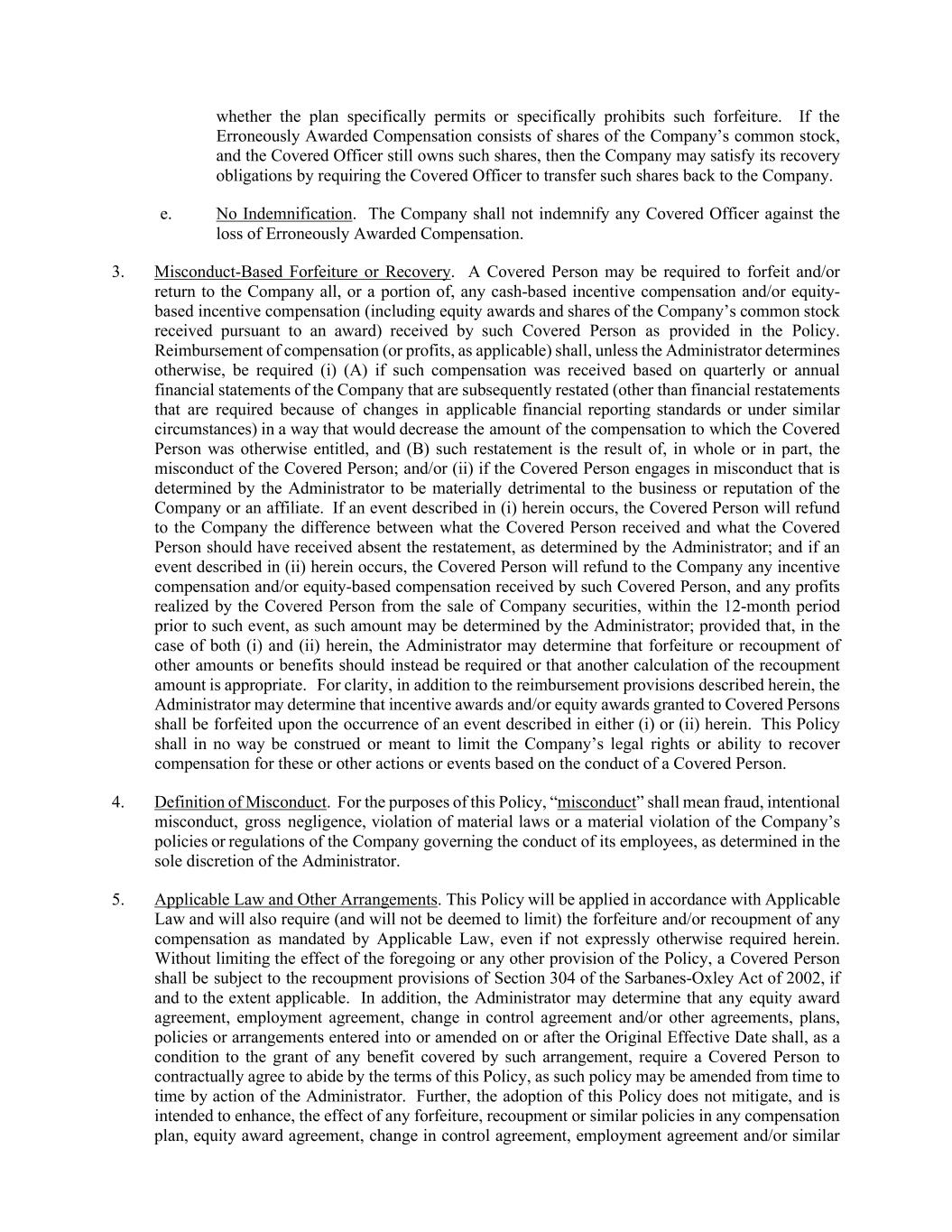
whether the plan specifically permits or specifically prohibits such forfeiture. If the Erroneously Awarded Compensation consists of shares of the Company’s common stock, and the Covered Officer still owns such shares, then the Company may satisfy its recovery obligations by requiring the Covered Officer to transfer such shares back to the Company. e. No Indemnification. The Company shall not indemnify any Covered Officer against the loss of Erroneously Awarded Compensation. 3. Misconduct-Based Forfeiture or Recovery. A Covered Person may be required to forfeit and/or return to the Company all, or a portion of, any cash-based incentive compensation and/or equity- based incentive compensation (including equity awards and shares of the Company’s common stock received pursuant to an award) received by such Covered Person as provided in the Policy. Reimbursement of compensation (or profits, as applicable) shall, unless the Administrator determines otherwise, be required (i) (A) if such compensation was received based on quarterly or annual financial statements of the Company that are subsequently restated (other than financial restatements that are required because of changes in applicable financial reporting standards or under similar circumstances) in a way that would decrease the amount of the compensation to which the Covered Person was otherwise entitled, and (B) such restatement is the result of, in whole or in part, the misconduct of the Covered Person; and/or (ii) if the Covered Person engages in misconduct that is determined by the Administrator to be materially detrimental to the business or reputation of the Company or an affiliate. If an event described in (i) herein occurs, the Covered Person will refund to the Company the difference between what the Covered Person received and what the Covered Person should have received absent the restatement, as determined by the Administrator; and if an event described in (ii) herein occurs, the Covered Person will refund to the Company any incentive compensation and/or equity-based compensation received by such Covered Person, and any profits realized by the Covered Person from the sale of Company securities, within the 12-month period prior to such event, as such amount may be determined by the Administrator; provided that, in the case of both (i) and (ii) herein, the Administrator may determine that forfeiture or recoupment of other amounts or benefits should instead be required or that another calculation of the recoupment amount is appropriate. For clarity, in addition to the reimbursement provisions described herein, the Administrator may determine that incentive awards and/or equity awards granted to Covered Persons shall be forfeited upon the occurrence of an event described in either (i) or (ii) herein. This Policy shall in no way be construed or meant to limit the Company’s legal rights or ability to recover compensation for these or other actions or events based on the conduct of a Covered Person. 4. Definition of Misconduct. For the purposes of this Policy, “misconduct” shall mean fraud, intentional misconduct, gross negligence, violation of material laws or a material violation of the Company’s policies or regulations of the Company governing the conduct of its employees, as determined in the sole discretion of the Administrator. 5. Applicable Law and Other Arrangements. This Policy will be applied in accordance with Applicable Law and will also require (and will not be deemed to limit) the forfeiture and/or recoupment of any compensation as mandated by Applicable Law, even if not expressly otherwise required herein. Without limiting the effect of the foregoing or any other provision of the Policy, a Covered Person shall be subject to the recoupment provisions of Section 304 of the Sarbanes-Oxley Act of 2002, if and to the extent applicable. In addition, the Administrator may determine that any equity award agreement, employment agreement, change in control agreement and/or other agreements, plans, policies or arrangements entered into or amended on or after the Original Effective Date shall, as a condition to the grant of any benefit covered by such arrangement, require a Covered Person to contractually agree to abide by the terms of this Policy, as such policy may be amended from time to time by action of the Administrator. Further, the adoption of this Policy does not mitigate, and is intended to enhance, the effect of any forfeiture, recoupment or similar policies in any compensation plan, equity award agreement, change in control agreement, employment agreement and/or similar
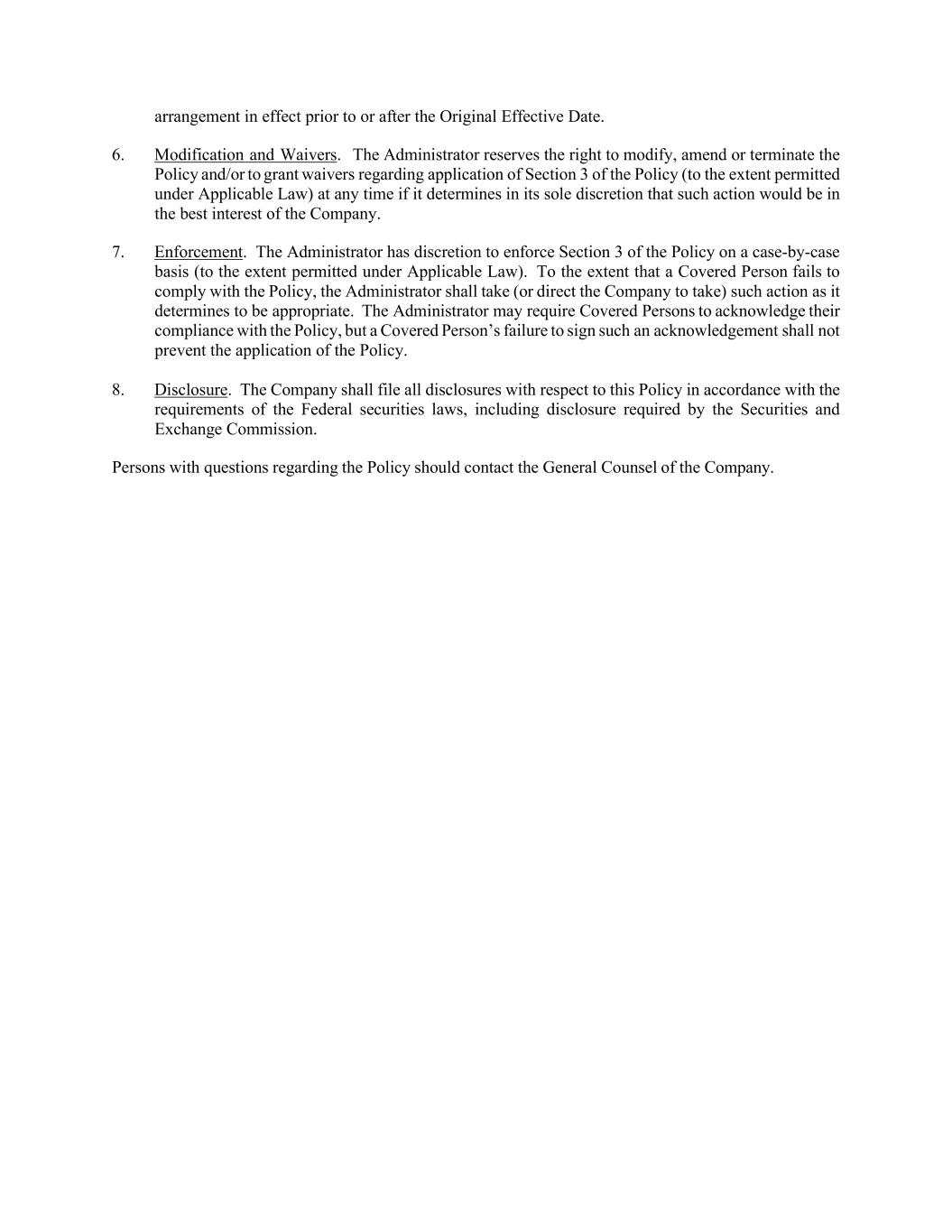
arrangement in effect prior to or after the Original Effective Date. 6. Modification and Waivers. The Administrator reserves the right to modify, amend or terminate the Policy and/or to grant waivers regarding application of Section 3 of the Policy (to the extent permitted under Applicable Law) at any time if it determines in its sole discretion that such action would be in the best interest of the Company. 7. Enforcement. The Administrator has discretion to enforce Section 3 of the Policy on a case-by-case basis (to the extent permitted under Applicable Law). To the extent that a Covered Person fails to comply with the Policy, the Administrator shall take (or direct the Company to take) such action as it determines to be appropriate. The Administrator may require Covered Persons to acknowledge their compliance with the Policy, but a Covered Person’s failure to sign such an acknowledgement shall not prevent the application of the Policy. 8. Disclosure. The Company shall file all disclosures with respect to this Policy in accordance with the requirements of the Federal securities laws, including disclosure required by the Securities and Exchange Commission. Persons with questions regarding the Policy should contact the General Counsel of the Company.